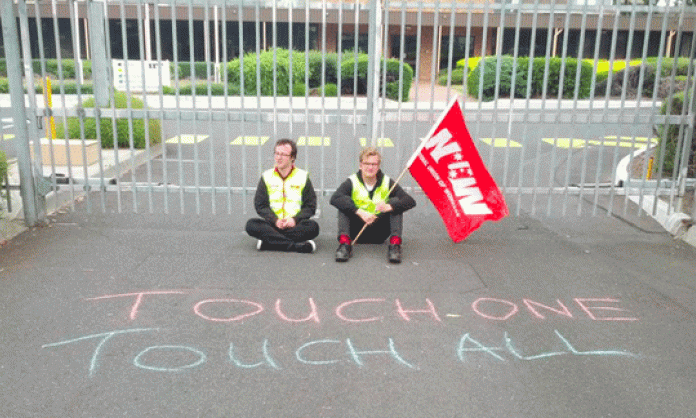It always amazes me what you can learn, sitting on some rickety chairs on a suburban street in Melbourne. Inside the factory, workers are well into their second day of the occupation at International Flavours and Fragrances. Outside, a shifting dozen or two people – workers, family, union organisers and visitors – sit around and talk.
It’s an education for me, at several levels.
For starters, I have no idea what goes on inside a flavour factory. Salt and vinegar chips, packet soups, lemonade icy-poles, mixed drinks and a thousand more products, all use the product that these workers produce. In my mind, I picture some strange version of Charlie and the Chocolate Factory. But as workers describe the various sections – powders, liquids, packaging, despatch – a more or less familiar discussion of skills, hazards, and sheer physical work emerges. The compounds being mixed can be volatile, and expensive. You don’t want to mess with them lightly, when one spill can cost thousands of dollars and put your safety seriously at risk. IFF management’s proposal to strip the morning break out of the agreement emerges from this discussion, not just as an insult to the workers, but as a serious threat to their health.
Discussion strays into the various bizarre ingredients that go into manufacturing familiar flavours. One of the workers goes into a detailed description of the trace elements of catshit that allegedly go into some well known products. I’m sure I’m the victim of a familiar joke played by “insiders” on outsiders, but it’s actually hard to tell – there’s plenty of mucking around as well as serious talk.
But there’s no mistaking the seriousness with which the workers view their struggle. And everyone’s clear that this battle is part of a much wider fight against the assault on our wages, our conditions, and our dignity.
A worker who moved from New Zealand a few years ago describes how, at that time, there seemed to be plenty of forklift jobs at $30 or $31 an hour. Now, he says, friends who are looking for the same sort of work don’t seem to be able to find much above $24, and with plenty getting $21 or less.
Some of the articles in Red Flag get a discussion going. People move on to football or family. But its working conditions and the tricks of management that are the mainstay of the discussions.
A delegate from the warehouse a couple of streets over gets chatting. We compare notes on how managers “manage” effective delegates, and the vicious game of divide and conquer management plays, using different pay rates for workers doing effectively the same work.
A couple of the workers from night shift in the pharmaceutical factory next door call past after knocking off. Management there want to take their 9-day fortnight, won decades ago, so they’re preparing for a fight. We joke about moving the caravan and portaloo up the road for their picket.
The discussions start and drift and break up and recombine. There’s interruptions as people go off to haggle for cheap fruit and bread with local traders, or pass food over the fence to the occupying workers. It’s a lockout, a sit in, a picket. It’s a rolling conversation. It’s woodsmoke, and chairs that fall apart. It’s the most ordinary thing that could happen, on an ordinary street, in an industrial suburb, in any city you care to name. In an ordinary, everyday way, it has paralysed the Australian operations of one of the biggest corporations on the planet.
It’s a lesson that I never get tired of learning. When workers stop working, it’s the most powerful thing on Earth.











